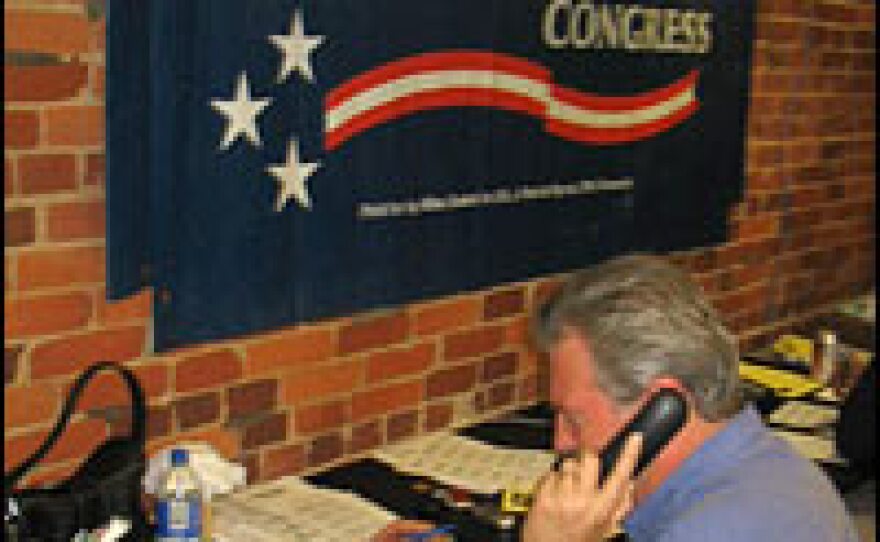
In key House races across the country, rural voters played a critical role in the Democrats' election success. They've been reliably Republican voters in past elections. But the issues of Iraq and the economy pushed them toward the Democrats.
Some of the nation's smallest places had the biggest impact election day. According to television network exit polls, Democratic congressional candidates won far more support from rural voters Tuesday than they did four years ago in the last mid-term election. In 2002, Republican congressional candidates had a 12-point margin over Democrats. But in 2006, that margin shrank to three points.
The surge in rural support for Democrats helps explain losses for Republican incumbents in 18 House districts with significant rural populations. Rural voters usually give Republicans big margins, which help overcome deficits in urban areas and tighter races in the suburbs. This election, the wide rural gap narrowed, denying Republican congressional candidates the boost rural votes usually provide.
One of the ousted Republicans is Mike Sodrel of Indiana's 9th Congressional District. The southeastern Indiana district is close to 48 percent rural. Sodrel had counted on rural "moral values" voters to help him eke out a win two years ago, when he beat incumbent Democrat Baron Hill. Monday night, on the eve of the election, Sodrel stood in the midst of a Republican phone bank as volunteers phoned voters.
Referring to rural voters, Sodrel said, "These are the people that still value the Second Amendment. They're people that believe in the sanctity of life. (They're) the people that believe marriage ought to be between one man and one woman."
Sodrel added that he didn't sense "any big sea change in that attitude. But, I guess we'll find out (election) night."
Election day, real estate agent Norma Woolum voted at the Tyson Learning Pre-School Center in Versailles, Ind. She's precisely the kind of voter Sodrel counted on. "The issues that drove my decision are abortion, the moral issues (and) gay marriage. I'm opposed to all of those," Woolum said, just after she voted. "And I won't vote for anyone that's going to promote that."
But moral values did not drive this election for rural voters, as they have in the past. Many voters listed the war in Iraq and the economy as their top issues in exit polls, and in random interviews Tuesday at polling places in Indiana's 9th District.
Jannie Hoyt voted near the tanning salon she owns in North Vernon, Ind. Hoyt said she wasn't sure the United States should be fighting in Iraq. "I don't feel we're getting the job done that I hoped we would have done by now, Hoyt said. "So, that is a big issue for me."
The significance of the Iraq war in the election's outcome makes some wonder whether the shift in rural votes will last. Seth McKee is a political scientist at the University of South Florida, St. Petersburg, where he studies rural and southern voting patterns. McKee suggests Tuesday's results are "an election-specific phenomenon" given "a very unpopular war."
"Can we take something away from this midterm (election) that is going to translate to 2008?" McKee asks. "It's difficult to make that call, given the conditions that we see right now and what we could see two years from now."
There is also something "sporadic" and "inconsistent" in the 2006 rural vote, says Bill Greener, a political consultant with the Republican firm of Greener and Hook. He notes that most rural voters still voted Republican, albeit in smaller numbers. "The rural vote constituted a firewall of sorts," he says, "and tempered the extent to which losses occurred."
An analysis of four key Senate races illustrates the inconsistency. Writer Bill Bishop and sociologist Robert Cushing focused on the actual Senate vote Tuesday in rural counties in Virginia, Missouri, Montana and Tennessee. They conducted their analysis for the Center for Rural Strategies, which sponsored a series of rural tracking polls in advance of the 2004 and 2006 elections.
Bishop and Cushing compared this year's results with results in earlier statewide elections in those states. They conclude that rural counties still provided significant margins for the Republican Senate incumbents in Montana and Missouri. Their data shows bigger-than-expected margins for Democrats in urban areas.
Senator-elect John Tester of Montana "may have a flattop and farm," Bishop and Cushing write, "but he's the new Senator from Montana because of the urban vote."
Bishop is writing a book about a deepening political divide between urban and rural areas. "The rural/urban divide is still strong," he says. "Given a good local candidate, these divisions can be muted, but the Democratic Party has a long way to go before it is competitive in rural areas."
The 2006 results in congressional races show the value of "good local candidates" for Democrats, according to Brian Mann, a public radio reporter in rural New York and author of Welcome to the Homeland: A Journey to the Rural Heart of America's Conservative Revolution.
"Democrats did remarkably well this year" in recruiting "candidates who could be viable in rural America, Mann says. "They found people who rural conservatives could at least look at," especially given political scandals and the unpopular war in Iraq.
One such Democrat is Brad Ellsworth, a county sheriff in Indiana's 8th Congressional District who supports gun ownership and opposes abortion and gay marriage. Ellsworth beat six-term Republican incumbent John Hostettler by 22 points.
"I think this election says to Democrats that you can speak to the concerns of rural voters. You can be heard," says Anna Greenberg, a Democratic pollster. "You have to address their really significant economic concerns, which are different and more severe than anybody else in the country."
But she notes that Democrats must be ready to address "big questions in the minds of rural voters about the so-called values issues and Democrats. And making a real effort to reassure or answer some of those questions will be critical to being heard on the economic issues."
Copyright 2022 NPR. To see more, visit https://www.npr.org. 9(MDAzMjM2NDYzMDEyMzc1Njk5NjAxNzY3OQ001))






